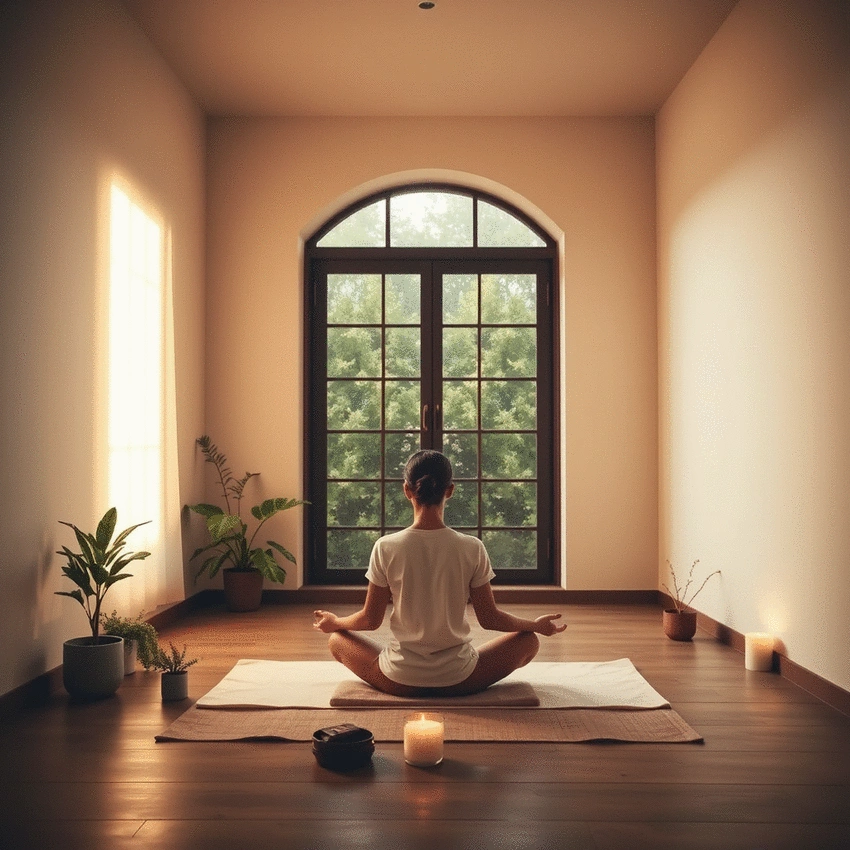Managing Stress with Holistic Methods
By Elara Finch / Oct 10
What if the secret to managing stress lies not in quick fixes but in embracing a holistic approach to well-being? By understanding the interconnectedness of mind, body, and spirit, we can transform our relationship with stress and cultivate a more balanced life.
Explore the benefits of various holistic techniques for managing stress effectively:
Mindfulness meditation significantly decreases anxiety and enhances emotional regulation.
Boosts serotonin levels, enhancing mood and overall mental health.
Promotes relaxation by lowering heart rate and instilling calmness.
Utilizes calming essential oils like lavender and chamomile for relaxation.
Stress affects us all, often sneaking into our lives when we least expect it. It can take a toll on both physical and mental health, leading to a variety of ailments. That’s why it’s crucial to explore holistic stress management approaches that address the whole person, not just the symptoms. For a deeper dive into embracing overall health, learn more about holistic health coaching for beginners.
By understanding how stress manifests in our bodies and minds, we can tackle it more effectively. Holistic methods don't just provide temporary relief; they aim to cultivate long-term well-being. At Coach Wellness Hub, we believe that embracing these approaches can truly transform how we manage stress!
Holistic health is about looking at the bigger picture—it’s an approach that considers the interconnectedness of mind, body, and spirit. Unlike traditional methods that may focus solely on symptoms, holistic health promotes balance and harmony among all aspects of life. This means that stress reduction is not just about eliminating stressors but enhancing overall health.
Incorporating holistic practices into your routine can pave the way for meaningful changes. Whether through nutrition, mindfulness, or exercise, these approaches empower us to take control of our stress and cultivate resilience. As you read on, you’ll see how each component works together to support your journey!
Our brains and bodies are intricately linked—what affects one often influences the other. Scientific research supports this connection, showing that mental health and physical well-being are deeply intertwined. For instance, stress can lead to physical symptoms such as headaches, fatigue, and digestive issues. You can explore more about the mind-body connection in wellness to deepen your understanding.
By recognizing this relationship, we can utilize strategies that benefit both our mental and physical states. Engaging in practices that nurture the mind-body connection can significantly improve stress management outcomes. This is a key element of what we promote at Coach Wellness Hub, where holistic wellness is our focus!
Recent studies have shed light on how holistic approaches can effectively reduce stress levels. For example, findings indicate that mindfulness practices can lower cortisol levels, the hormone linked to stress. Here are a few key insights:
These insights emphasize why a holistic approach to stress management can lead to profound benefits for both mind and body. At the Coach Wellness Hub, we encourage you to explore these practices to find what resonates with you!
There are numerous holistic techniques available to help alleviate stress, each offering unique benefits. Incorporating a variety of these methods into your routine can create a well-rounded approach to stress management. Here are some popular techniques to consider:
Each of these techniques brings its own set of advantages, making them effective tools for stress relief. As we dive deeper into specific practices, you’ll discover how to implement them into your daily life!
Mindfulness meditation focuses on being present in the moment and observing thoughts without judgment. This practice can help reduce stress and improve emotional resilience. For beginners, try these simple exercises:
Mindfulness is a powerful tool for fostering a sense of peace amidst chaos. Give it a try, and you might be surprised by the clarity it can bring!
Yoga combines movement, breath, and mindfulness, making it a fantastic holistic practice for stress management. Certain poses are particularly effective in promoting relaxation:
Incorporating these poses into your routine, even for a few minutes, can significantly enhance your ability to cope with stress.
Deep breathing is a quick and easy way to achieve instant calm. Here are a few techniques to try:
Integrating deep breathing exercises into your daily routine can provide immediate relief and help you feel more grounded.
Aromatherapy utilizes essential oils to promote relaxation and well-being. Some popular oils for stress relief include:
Using a diffuser or simply inhaling these scents can enhance your stress relief practices.
Ayurveda, the ancient Indian system of medicine, emphasizes balance and harmony among body, mind, and spirit. Key principles include:
By exploring Ayurvedic principles, you can enhance your understanding of your unique needs and tailor your stress management techniques accordingly.
Acupuncture involves inserting fine needles into specific points on the body to promote relaxation and alleviate stress. Some benefits include:
Consider seeking a licensed acupuncturist to explore this effective stress-relief method!
Here's a brief recap of the key points discussed so far:
As we wrap up our discussion on holistic stress management, it’s clear that these approaches offer a wealth of benefits. Emphasizing the connection between the mind and body can lead to more effective stress relief strategies. By integrating practices like mindfulness, yoga, and nutrition, we can foster a greater sense of well-being.
Furthermore, holistic methods focus on the *whole person* rather than just symptoms. This can lead to long-term stress management and improvements in mental and physical health. By addressing the root causes of stress, we pave the way for a more balanced life. Just imagine how it would feel to tackle stress with a well-rounded toolkit!
Now that we understand the benefits, let's talk about actionable steps you can take to integrate holistic practices into your daily routine. Adopting these practices can help you manage stress more effectively and create a peaceful mindset. At Coach Wellness Hub, we believe that small changes lead to big transformations—so let's get started! For more insights on how to foster resilience, check out our article on resilience strategies for coaching.
One of the best ways to kick off this journey is by incorporating *nutrition and exercise* into your daily life. These elements are vital in supporting your mental and physical well-being. Here are some simple approaches you can start with:
Creating a personalized self-care ritual is another powerful way to enhance your holistic approach to stress management. This ritual can be as simple or elaborate as you like—what matters is that it resonates with you. Think of activities that make you feel good and promote relaxation.
Some ideas to get you started include:
Remember, self-care isn’t a luxury; it’s a necessity for optimal health! By making time for yourself, you can better support your clients and loved ones too.
I invite you to embark on this journey of holistic stress management with enthusiasm! It’s all about finding what works for you and integrating it into your daily life. The beauty of holistic practices is their adaptability—you can start small and gradually build up to more advanced techniques. If you're looking to transform your health with coaching, these principles are a great starting point.
Consider these first steps:
Your journey doesn’t have to be solitary! Share your experiences with the Coach Wellness Hub community—let’s inspire each other to embrace holistic health together!
For those eager to deepen their understanding of holistic health, I’ve compiled a list of valuable resources. These will not only enhance your knowledge but also provide ongoing support as you explore various techniques:
As you continue on this path, remember that Coach Wellness Hub is here to guide and support you every step of the way. Together, we can build a healthier, more balanced future! To further enhance your journey, consider exploring stress management for wellness coaches, which offers valuable strategies for both personal and professional application.
Here is a quick recap of the important points discussed in the article:

 Managing Stress with Holistic Methods
What if the secret to managing stress lies not in quick fixes but in embracing a holistic approach t
Managing Stress with Holistic Methods
What if the secret to managing stress lies not in quick fixes but in embracing a holistic approach t
 Stress Management for Wellness Coaches
In today's fast-paced world, stress has become an unavoidable part of life—especially for wellness
Stress Management for Wellness Coaches
In today's fast-paced world, stress has become an unavoidable part of life—especially for wellness
 Nutrition's Role in Mental Wellness
What if the key to enhancing your mental health lies in the foods you choose to eat? Recent research
Nutrition's Role in Mental Wellness
What if the key to enhancing your mental health lies in the foods you choose to eat? Recent research